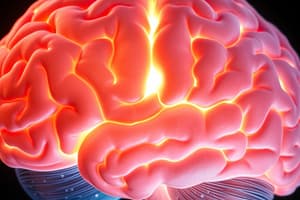Podcast
Questions and Answers
What is the concept that views the mind and body as separate substances?
What is the concept that views the mind and body as separate substances?
- Physicalism
- Dualism (correct)
- Dual-aspect theory
- Reductionism
Which theory suggests that all areas of the brain are capable of performing similar tasks?
Which theory suggests that all areas of the brain are capable of performing similar tasks?
- Equipotentiality (correct)
- Grandmother cell theory
- Functional specialisation
- Phrenology
Which lobe of the cerebral cortex is primarily responsible for processing visual information?
Which lobe of the cerebral cortex is primarily responsible for processing visual information?
- Frontal lobe
- Temporal lobe
- Occipital lobe (correct)
- Parietal lobe
Which part of the brain connects the two cerebral hemispheres?
Which part of the brain connects the two cerebral hemispheres?
Which of the following best describes the 'grandmother cell theory'?
Which of the following best describes the 'grandmother cell theory'?
What defines Brodmann areas in the cerebral cortex?
What defines Brodmann areas in the cerebral cortex?
Which term refers to the region of the brain that processes sensory information related to touch?
Which term refers to the region of the brain that processes sensory information related to touch?
Which theory states that psychological traits are not scientifically grounded?
Which theory states that psychological traits are not scientifically grounded?
What is primarily contained within gray matter in the brain?
What is primarily contained within gray matter in the brain?
Which of the following best describes reductionism in psychological contexts?
Which of the following best describes reductionism in psychological contexts?
Flashcards
Biological Psychology
Biological Psychology
The study of how the brain influences behavior, including the contributions of genes, hormones, and drugs.
Dualism
Dualism
The concept that the mind and body are separate substances.
Phrenology
Phrenology
An outdated theory claiming that psychological traits are linked to the size and shape of the skull.
Functional Specialization
Functional Specialization
Signup and view all the flashcards
Equipotentiality
Equipotentiality
Signup and view all the flashcards
Gray Matter
Gray Matter
Signup and view all the flashcards
White Matter
White Matter
Signup and view all the flashcards
Corpus Callosum
Corpus Callosum
Signup and view all the flashcards
Cerebral Cortex
Cerebral Cortex
Signup and view all the flashcards
Brain Development
Brain Development
Signup and view all the flashcards
Study Notes
Biological Psychology
- Examines how the brain influences behaviour.
- Considers the role of genes in behaviour.
- Explores the impact of hormones and drugs on behaviour.
Historical Foundations
- Ancient debate on the physical basis of thoughts (heart vs. brain).
- Early theories on the relationship between body and mind:
- Dualism: Mind and body are distinct substances.
- Dual-aspect theory: Mind and body are two ways of describing the same phenomenon.
- Reductionism: Mind can be explained in terms of physical processes.
- Phrenology: Proposed that specific brain areas corresponded to personality traits, based on skull shape.
- Critically, phrenology lacked scientific rigor.
Functional Specialization
- Different brain areas have specialized roles.
- Equipotentiality: Brain areas have equivalent potential to perform tasks.
- Grandmother cell: A single neuron may code for a complex stimulus (e.g., a specific person). Dynamic coordination rather than a fixed one-to-one relationship between locations and functions.
- A continuous spectrum rather than fixed points of functional specialization.
Brain Structure
- Gray matter: Contains neuronal cell bodies.
- White matter: Composed of axons, myelin, and glial cells.
- Corpus callosum: A large white matter tract connecting both brain hemispheres.
Anatomical Terms
- Dorsal: Top side.
- Ventral: Bottom side.
- Anterior: Front side.
- Posterior: Back side.
- Lateral: Outer side.
- Medial: Inner side.
- Coronal: Frontal plane (like slicing through a crown).
- Sagittal: Longitudinal plane (like slicing down the middle).
- Axial: Horizontal plane (like slicing across).
Cerebral Cortex
- Consists of two hemispheres (left and right).
- Divided into four lobes (frontal, parietal, temporal, occipital).
- Each lobe has distinct gyri (ridges) and sulci (grooves).
- Brodmann areas: Regions differentiated by cellular structure.
Brain Development
- Human brains are relatively large.
- Significant brain development occurs after birth.
- Brain connectivity differs from other species.
- Humans show a capacity for advanced learning, particularly in childhood and adolescence.
Studying That Suits You
Use AI to generate personalized quizzes and flashcards to suit your learning preferences.




